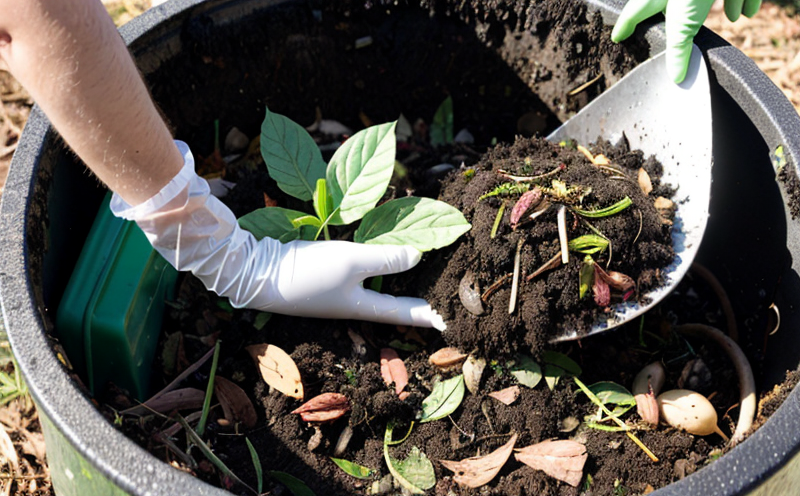ASTM E2720 Biofilm-Forming Microorganism Testing in Compost Systems
The ASTM E2720 standard is a critical tool used by laboratories to evaluate the presence and activity of biofilm-forming microorganisms in compost systems. This testing method is essential for ensuring that compost facilities meet environmental standards, particularly those related to pathogen reduction and microbial control.
Compost systems are crucial components of waste management strategies worldwide, playing a vital role in managing organic waste while producing beneficial end products like soil amendments. Pathogens present in waste streams can pose significant risks if not adequately controlled during the composting process. The biofilm-forming microorganisms play a pivotal role in this context as they contribute to the biological stabilization of the compost material.
The ASTM E2720 method focuses on quantifying and identifying these specific types of microorganisms that form biofilms, which are communities of microorganisms adhered to surfaces. The presence of these microorganisms is indicative of their ability to persist in the environment, potentially leading to a higher risk of pathogen transmission if not properly managed.
The testing procedure involves several steps: first, samples from composting systems are collected and prepared according to stringent protocols outlined in the ASTM E2720 standard. These samples are then incubated under controlled conditions to stimulate biofilm formation. The next step is identifying the microorganisms present using advanced microbiological techniques such as molecular diagnostics or culture-based methods.
The results of this testing provide valuable insights into the microbial ecology of compost systems, helping waste management facilities and R&D teams optimize their processes for pathogen reduction and overall quality control. Compliance with ASTM E2720 is not only a regulatory requirement but also a best practice that enhances public health outcomes by ensuring safe end products.
The significance of this testing method extends beyond just composting systems; it has broader implications for the entire waste management sector, particularly in regions where organic waste management is a priority. By adhering to ASTM E2720 standards, laboratories and facilities can demonstrate their commitment to sustainable practices and regulatory compliance.
- International Acceptance: ASTM E2720 is widely recognized globally, with many countries adopting it as part of their national standards for compost quality assurance.
Benefits
The implementation of ASTM E2720 biofilm-forming microorganism testing in compost systems offers numerous benefits to stakeholders across the waste management sector. Quality managers and compliance officers benefit from having a standardized method for assessing microbial quality, ensuring that their facilities meet stringent regulatory requirements.
R&D engineers can leverage this testing to refine and optimize composting processes, identifying areas where improvements are needed to enhance pathogen reduction. For procurement teams, adherence to ASTM E2720 ensures the reliability of purchased compost materials, reducing risks associated with contaminated products.
The primary benefit lies in public health protection. By ensuring that biofilm-forming microorganisms are effectively managed during the composting process, facilities can significantly reduce the risk of pathogen transmission. This is particularly important in regions where organic waste management plays a key role in environmental sustainability and resource recovery.
Additionally, compliance with ASTM E2720 enhances a facility's reputation as a leader in sustainable practices. It demonstrates a proactive approach to addressing public health concerns while contributing positively to the environment.
Quality and Reliability Assurance
The quality and reliability of testing results are paramount when it comes to ASTM E2720 biofilm-forming microorganism testing. Laboratories must adhere strictly to the ASTM E2720 protocol, ensuring that all steps from sample collection to final analysis are performed with precision.
Sample preparation is a critical first step, requiring strict adherence to the outlined procedures in the standard. This includes proper sterilization of equipment and materials to prevent contamination. Once prepared, samples are incubated under controlled conditions to encourage biofilm formation, which can take several days depending on the specific composting process.
The identification of microorganisms is carried out using advanced microbiological techniques such as PCR (Polymerase Chain Reaction) or culture-based methods like agar plate culturing. These methods ensure accurate and reliable identification, providing a comprehensive picture of the microbial community present in the compost system.
Reporting of results must be detailed and transparent, clearly outlining the types and quantities of biofilm-forming microorganisms detected. This information is crucial for stakeholders to understand the effectiveness of their composting processes and make informed decisions about necessary adjustments.





